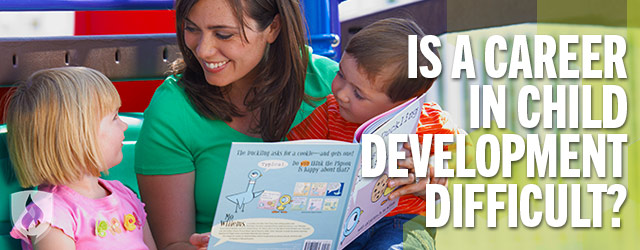
So you’re toying with the idea of becoming a preschool teacher. Some people would say you’re crazy for wanting to spend so much time with young ones. You view it as an opportunity to enrich little ones’ lives through education. But you sometimes wonder if they’re right—do you really have what it takes? You can’t afford to end each day with no energy left for your family and other commitments.
So is teaching young ones really as hard and strenuous as some think? Obviously, there is no conclusive answer to this question. Some will tell you that teaching preschool is a challenge. Others will insist it’s a breeze. Most probably fall somewhere in the middle of that spectrum.
But for you to make an informed decision for yourself, you need an unadorned glimpse into the job. You need the good, bad and in-between of teaching tots. We connected with preschool teaching pros to help you determine if you’re cut out for a challenging, yet rewarding, career in child development.
The recipe for a great preschool teacher
Like most jobs, teaching tots requires a healthy mixture of both acquired skills and natural abilities. Keep reading to see what our panels of pros say about the sticky, sweet and vital ingredients for working in child development.
The sticky stuff
Kids always seem to have some kind of glue or jam on their hands. It doesn’t matter if glue or jam is even in the nearby vicinity, the gooey hands still happens! In the same way, working with young children can be sticky and confusing at times. If you want to ensure you're ready for a career in child development, you need to first be aware of the sticky stuff that comes along with teaching early childhood education (ECE).
Communication with kiddos: Adults are used to speaking and, for the most part, being understood. It’s easy to forget that sometimes the little ones are speaking an entirely different language.
“We can articulate all sorts of things to young children, but without reiteration and demonstration... they don't always understand,” says Antrina Peterson, toddler teacher at New Horizon Academy. She goes on to explain that the children you’ll be working with are in the very early stages of learning language. Preschool teachers mustn’t forget that even the simplest directions are still a learning experience for these children.
Lack of recognition: You know when you’re excited about something and you turn to the person next to you and they look like they couldn’t care less? Working in child development can resemble this at times. You’ll be making a direct impact and changing the lives of countless children but you won’t always receive societal recognition for your work, which can be disheartening at times.
Peterson believes teachers in general must deal with the societal perception that they aren’t “real professionals”, equivalent to doctors, accountants or business managers. “It’s even more of an uphill battle for ECE professionals,” she adds. She’s hopeful that these distorted perceptions of her profession will change for the better, but it’s still an important concept of which aspiring preschool teachers should be aware.
Meeting the needs of the masses: Okay, so you won’t be asked to feed a hundred kids with a few saltines and a juice box, but you will need to learn how to keep the attention of a classroom full of children who are at different levels of education and maturity. Angie Janiszeski is a pre-K teacher at Luverne Elementary School in Minnesota and says this is no easy feat.
“Some [children] know everything in the curriculum and some have a lot less experience,” Janiszeski explains. “It is a challenge to keep [and] get all the kids where they need to be.”
The sweet stuff
If you can stick it out through the sticky stuff, you'll get to enjoy the sweet stuff! There's nothing like that warm, fuzzy feeling you get when you help someone in need. Multiply that by two when you have an opportunity to shape the future leaders of your community. Here are a few of the sweet spots that come with teaching preschool.
Helping shape young minds: When you get down to it, preschool is usually the first educational experience a child will take part in outside his or her home. As the teacher, you will be one of the first people introducing them to concepts they will carry throughout the rest of their education.
Seeing a child’s eyes light up when they discover something new is one of the best parts of the job, says Janiszeski. And just imagine all of the new things you will be teaching them!
No standardized tests: Most educators constantly have a little nagging thought in the back of their mind as they try balancing curriculum, classroom control and getting to know their kids—standardized tests. As a preschool teacher, you can avoid that apprehension and focus fully on your students.
“Kids can still be kids in preschool,” says Janiszeski, “We don’t have to worry about standardized tests.”
Little bits of love: Society may not always hold your position in high esteem, but you can be assured you will find appreciation and joy from the young ones you serve. Peterson says she is so proud of the route she chose, especially when she sees the smiles and hears the “I did it!” exclamations from her students. She also recounts how great it was to attend a conference and hear from parents of preschoolers.
“Hearing testimonies from parents about what a relief it is to have not only child care, but structure, curriculum and fun available to them before they even reach school age—it was a truly beautiful experience!” she says.
The vital stuff
Every recipe has a few staple ingredients that hold everything together, such as flour, baking soda or yeast. Similarly, there are certain qualities that are essential for a successful career in child development. Take a look at some of the most important elements.
A natural desire to nurture: “Having a nurturing soul only continues to kindle the relationship you begin with a child—if nothing is working in a difficult situation, being a nurturer will at least bring the calmness back,” says Peterson.
As you teach young ones, there are some key qualities and skills you will need to possess to find success in your position. Your students are still at a very young age and need to sense that you are a person who can help them cultivate new concepts and develop their knowledge.
Patience and flexibility: These two ingredients are essential when teaching young ones! As students are learning how to work within structure, they will often get side-tracked and you will have to patiently wait to regain the attention of the class or be agile when the lesson you prepared doesn’t go as planned.
“If kids are really interested in a topic, we will stop what we are doing and discuss the interest,” says Janiszeski of flexibility. When it comes to patience, she says explains that not all kids will do what you ask of them. Some may not be ready or able to do things you expect them to do, but it’s important to remain calm and persistent.
Honesty and direction: A child needs stability to feel comfortable and thrive. By being honest and direct with your expectations and instructions, you begin to build the valuable consistency needed in a classroom. Your students aren’t the only ones that will benefit from honesty and directness. These skills will come in handy with other teachers, paraprofessionals and parents when discussing a student and his or her progress, says Angie.
Do you have what it takes to teach tots?
Now you know what it takes to be a successful preschool teacher. Not everyone is cut out for a career in child development, but those who are up for the challenge enjoy the rewarding feeling of empowering young minds and making a lasting impression.
If you think you have what it takes, it’s time to familiarize yourself with the process of getting started. Check out this handy guide to becoming a preschool teacher.
Related Articles:




